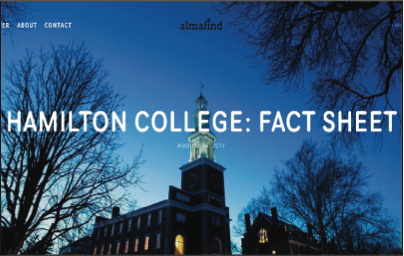
When I visited Hamilton as a prospective student, a since-graduated senior personally showed us around campus. Instead of taking an official tour, we walked around the glen, through his suite in Babbitt (“Sorry about all the beer bottles, Ms. Lebowitz…”), and checked out the music practice rooms in Schambach. More than that, however, my friend gave me his honest perspective on the school. Yes, the people and professors are wonderful, he said, and the abroad programs are terrific. However, he then told me, the administration is cracking down on Greek life and the food sucks.
His transparency helped me more than I understood. That’s because, contrary to my parents’ assurances, I didn’t “just know” when I left the Hill that afternoon that I would attend school there. Yes, I felt conflicted by the stark pros and cons reported by my friend during my personalized tour, but feeling informed felt powerful.
For many prospective college students, the notion of a “perfect fit” school seems like a myth, for much of the search process is dominated by the extremely manufactured images of college brands. Generic websites, shiny brochures, and superficial campus tours abound with whitewashed and distilled information. To illuminate the multifaceted nature of most schools, the rest of the story needs to be told not by the school, but by students.
For over a year now, I’ve worked (currently as Editor-in-Chief) for Almafind, the brainchild of College of Mount Saint Vincent senior Denisha Kuhlor, who runs the startup-in-progress as CEO. A web platform aimed at providing prospective college students with authentic, student-generated content from target schools, Almafind promotes the kind of transparency which Kuhlor and I (and the rest of our team) find lacking in the college search process. “The goal of Almafind is to bring together an ambitious crew of college students around the country and give them the tools they need to paint an authentic and transparent narrative of their institution,” Kuhlor said, elaborating, “the good and the not so good.” Several student-written news articles on Almafind’s home page concern topics such as the Cornell Student Assembly’s recent condemnation of hate speech, and represent the very start of what our team intends to build into an expanding feed of student-generated content. These sorts of “moment-defining” events, as Kuhlor calls them, are more common now than ever before, and deserve visibility during the college search process.
Kuhlor perceives this sort of student content generation as extending directly from the trend of social media, claiming, “with the record high usage of social media, I do not think college admissions and media relations offices are always cognizant of how much of their institution’s narrative is already written for them.” Through Almafind, Kuhlor and her team intend to provide an accessible space for these more genuine and diverse narratives generated by students, for students. Existing
websites such as the immensely popular Niche.com (formerly College Prowler) that feature rankings and reviews from current students do not offer options for networking or personalization, and here Almafind pinpoints a market gap. The platform will offer a networking service which will allow prospective students to video-chat with current students at the target school for a small fee. By organizing diverse teams of students at dozens of different schools, Almafind allows a prospective student to choose which college student to chat with based upon common background, interests, or activities.
Almafind continues to grow rapidly, and our team is excited to provide clarity and information to prospective college students on the boundaries of the search process, especially international and low-income students unable to afford college visits. Extending its reach to small, diverse teams of content generators at schools across the country, Almafind represents the next generation of college search resources: personalized, readily accessible, cheap, and above all, authentic.

















